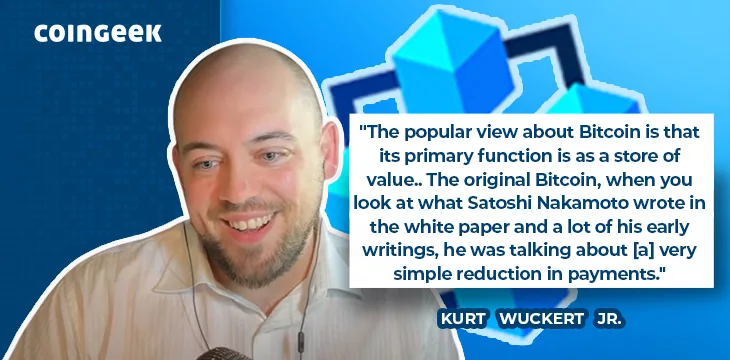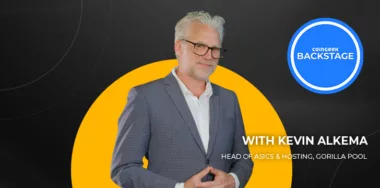Last week, CoinGeek’s Kurt Wuckert Jr. joined the Human ReAction podcast to discuss the Battle for Bitcoin. Naturally, this covered some of its history, the controversies and debates that have defined Bitcoin’s life so far, and some of the characters, including Dr. Craig Wright.
Why is ‘crypto’ important?
The host, David Rand, begins with a broad question of why digital currencies and blockchain technology are important.
Wuckert says it depends on who you ask. For him, it’s all about utility, and having an attestation of truth is what he’s most excited about. For example, blockchain can work as an attestation of property ownership. It’s the next step towards true freedom, dramatically reducing friction related to payments and boosting data integrity.
The popular view is that Bitcoin is a store of value, Wuckert says. Satoshi talked about
micropayments and how Bitcoin can solve all sorts of other problems related to trust. It’s fundamentally a competitive network, with each node competing to be the best, serving the good of all. He reminds us that Bitcoin was supposed to be lightning-fast and almost free, and BTC has strayed a long way from that.
Why the block size limit?
Wuckert replies that he thinks it was malicious. The first big pump in Bitcoin price got many people interested, and naturally, some of them studied it. One of the parties that did this was Mastercard (NASDAQ: MA), and their VC arm, Mastercard Ventures, created the Digital Currency Group.
Since then, DCG has invested in almost every Bitcoin startup, and most of the major exchanges are in its portfolio. Essentially, Bitcoin was co-opted by old money interests who stood to lose the most from it.
Shortly after they got involved, the store-of-value narrative took hold, and all of Bitcoin’s disruptive potential was shelved. These days, most people have no idea it was supposed to be a payment technology and are only focused on token prices and speculation.
What is decentralization?
Wuckert answers this by quoting Satoshi—Bitcoin nodes would eventually end up in data centers, its inventor said. He thought commercial actors would run nodes for a profit.
Decentralization means no single point of failure, Wuckert continues. Technically, a network with three nodes is decentralized. At some point, adding more nodes for the sake of it has diminishing returns. Ultimately, how many is enough is a political question.
Speaking of nodes, the conversation veers into a discussion on miners and the economic incentives they face. Satoshi said there would either be a huge number of transactions or none at all, and as the halving approaches, it’s a reminder that transactions will have to replace the subsidy someday.
What about blockchains like Ethereum? Wuckert says that if it succeeds, it fails. It can’t scale, and we’ve seen evidence of that many times. On the BSV blockchain, by contrast, fees stay extremely low even when there’s huge transaction throughput. Business models that require scale only have one option, and it’s Bitcoin SV.
Who is Craig Wright, and what is the COPA trial?
Wuckert answers that Dr. Craig Wright might actually be Satoshi Nakamoto, and in his view, he is. He’s also the biggest of the big blockers, and it remains to be seen if he’s right on that.
Right now, Dr. Wright is in court. He’s being sued by COPA, the so-called Crypto Open Patent Alliance, which wants to prove he is not Satoshi and, therefore, doesn’t have property rights related to Bitcoin.
Dr. Wright was outed by Wired and Gizmodo back in 2015. Soon after, perhaps too soon, articles were published, walking the claim back and trying to paint him as a likely fraud. Big parts of the story are missing, but Wuckert guesses that 80-85% of what Dr. Wright says is true, while the other parts of the story have to remain hidden.
So far, Dr. Wright has not produced the absolute and irrefutable proof that he invented Bitcoin to his distractors satisfaction, so he remains a controversial figure in their eyes. He could also unravel $1 trillion in value in BTC, so he’s perceived as a threat by people whose wealth is wrapped up in it.
Why doesn’t he just sign and prove it that way? Because he doesn’t believe that possession of keys equals identity—this is a notion and is against his principles. He also believes that people will simply say he stole Satoshi’s keys, so he wants to prove himself in court.
What is COPA v Wright really all about? Wuckert says Dr. Wright holds copyright over the Bitcoin white paper and is asserting database rights. If he proves he is Satoshi, this has massive implications, and this case will inform several others. For example, he’s accusing Coinbase (NASDAQ: COIN) and Kraken of passing off BTC as Bitcoin, a form of fraud, and there are other related cases.
Wuckert says Dr. Wright is a strange character who does not think the way other people do, which can confuse outsiders and frustrate people supporting him. His values are very different from those of so-called ordinary people, but we should expect that from someone with autism who studies for dozens of degrees at once. Interestingly, he has said he can move coins when he proves he is Satoshi Nakamoto, so that may be something we see if the case goes his way.
Before the case, Dr. Wright made a settlement offer. Ultimately, COPA couldn’t accept it for political reasons. While some perceived it as him trying to bail out on the case and minimize damage, Wuckert believes it was a Machiavellian move. He can now say he wanted peace and tried to let them compete fairly before obliterating them.
To hear more about how Bitcoin has evolved, the differences between BTC, BCH, and BSV, and the ideal vision for how Bitcoin can positively impact the world, check out the Human ReAction podcast episode here.
Watch: Bitcoin—The electronic cash system
New to blockchain? Check out CoinGeek’s Blockchain for Beginners section, the ultimate resource guide to learn more about blockchain technology.










